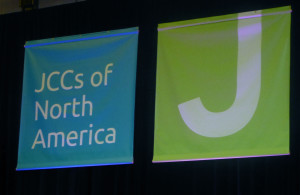
By Dorothea Shefer-Vanson

SAN DIEGO –The JCCs (Jewish Community Centers) that are to be found in almost very town and city throughout North America provide a focal point for activities that reach out to Jews of all kinds, no matter what form or shape their convictions take. I was recently taken to visit the one in Richmond, Virginia, situated in an impressive building, staffed by friendly people, and providing activities for members of all ages.
Thus, my relatives’ pre-schoolers were enjoying the activities provided for their age-group, the adults were able to attend classes and hear lectures, and the older generation could go to keep-fit classes. What really gave me a thrill was to see that many of the signs inside the building were in Hebrew as well as English, and in the car-park the areas were marked by letters of the Hebrew alphabet (which also serve as numbers).
So it seemed only logical, when I reached San Diego, to attend at least one of the sessions of the JCC Biennial convention currently being held in that city. Just reading the program was an education in itself. Among the various lectures and events were such items as ‘Mehitza Schacharit Services’ and at the same time ‘Non-Mechitza Schacharit Services,’ thus catering for all forms of religious observance (though I’ve no idea how good attendance was at either).
In addition, each day was slated to start with early morning fitness activities of various kinds, including yoga and/or a run around San Diego. Again, I don’t know how many attended, if any, but the intention was certainly admirable. It might be a good idea to extend the principle to other meetings, which tend to be of a sedentary nature.
The plenary session I attended kicked off (somewhat belatedly, of course) with a series of honors being awarded to members and benefactors who had performed outstanding services for the organization. Congratulations were bestowed liberally, and a leading educator was awarded a special prize for his contribution to Jewish leadership education — an important aspect of Jewish life in the USA.
In his brief acceptance speech, the recipient, Jody Hirsh of Milwaukee, cited the three-year dispute between the schools of Shammai and Hillel,which was eventually settled when a heavenly voice (bat kol in Hebrew) proclaimed ‘both are right’ (it sounds better in Hebrew). The speaker was at pains to point out that though many things in Judaism can be understood (and are interpreted) in different ways, they are all right in the sense that they serve to maintain a vibrant Jewish community. He added that the role of the Jewish educator is, among other things, to emphasize the pluralism and diversity of Jewish life, of which the JCCs constitute the real center.
The outgoing President and CEO of the JCC Association, Allan Finkelstein, spoke about the various ways in which the achievements of the movement are measured, declaring that mere numbers of participants in activities is insufficient to reflect their true nature. He placed particular emphasis on the participation of youngsters in the JCC’s annual day and summer camps, and especially their Maccabi games, which bring youngsters from all over the USA together for a week of sporting competitions .What he found particularly encouraging was the return rate of these youngsters to further events of this kind as well as their active involvement in JCC activities subsequently.
Naturally, support for Israel is among the features that were emphasized by Finkelstein, and he spoke at length about the efforts, which the organization supports, to have a minute of silence at all Olympic Games in memory of the eleven Israeli athletes murdered by Palestinian terrorists at the Munich Olympics. These efforts have not as yet been successful, but a minute of silence was held at the opening ceremony of the last JCC Maccabi games. At that point a video message of thanks to the convention by the widow of athlete Andre Spitzer was broadcast. She has spent many years campaigning for some acknowledgement of this tragedy by the international sporting community, and her presentation (as well as her English) was both polished and affecting.
Finkelstein ended his presentation, which was interspersed by short speeches from the floor or by video from participants in various activities and programs, by emphasizing the need to further expand the activities provided by the various JCCs and to reach out to a wider Jewish audience. Jewish education is at the forefront of these activities, and especially education for Jewish leadership. Although he noted that it was still necessary to further improve the way the JCCs are run and expand their range, it was nevertheless incumbent upon Jews to be ‘a beacon of peoplehood,’ and to remain committed to excellence in all fields.
*
Dorothea Shefer-Vanson is a freelance writer, author, and translator based in the Jerusalem suburb of Mevasseret Zion. She may be contacted via dorothea.shefer@sdjewishworld.com San Diego Jewish World seeks sponsorships to be placed, as this notice is, just below articles that appear on our site. To= inquire, call editor Donald H. Harrison at (619) 265-0808 or contact him via donald.harrison@sdjewishworld.com